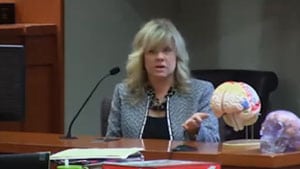

The Expert: Dr. Angela Ashley, an Atlanta-based neurologist and professor at Emory University, testifying for the plaintiff on the severity of the plaintiff’s brain injury and delivering an opinion on its cause.

Dr. Angela Ashley, an Atlanta neurologist and professor at Emory University, testifies in a 2016 Georgia trial over a traumatic brain injury a driver claims she suffered in a rainy night crash with a Papa John’s Pizza delivery driver.
With the nature and severity of the plaintiff’s brain injury a key issue of dispute in the case, Ashley details her findings, noting that she initially determined the plaintiff suffered from post-concussion syndrome.
Initially, Ashley says Williams was thought to have a mild traumatic brain injury since she had not lost consciousness, but after Ashley investigated more thoroughly, it became apparent that, not only did she have symptomatology that could be seen with moderate brain injury, imaging indicated a more moderate injury, as well.
Although the patient underwent a CT scan of her brain during emergency room treatment immediately following the accident, its results did not reveal structural abnormalities, and she was discharged without receiving the usual screening tests that are performed to rule out concussion. Ashley, however, says she is not surprised the CT scan was unrevealing. A concussion screen, if one had been performed, would likely have allowed the ER team to diagnose Williams’ concussion.
Later, when Williams was referred to Ashley, the doctor realized the severity of her symptoms and ordered an MRI, a more accurate imaging test than a CT. Ashley notes that, while neither a CT nor MRI are likely to reveal the structural abnormalities associated with mild traumatic brain injuries, an MRI is more likely to do so. And in this case, Williams’ MRI showed she had suffered a focal brain injury.
The expert goes on to explain the difference between a diffuse brain injury and focal brain injury, such as the one suffered by Williams. In the former type, there will be microfractures of the protective myelin sheath surrounding the nerves in the brain due to the transmitted concussive energy. This will lead to general cognitive and mood disturbances. With a focal brain injury, however, the brain is “discretely” damaged such that “we can actually see the disruption to that white fiber tract.”
Presenting the critical MRI image, Ashley points out the brain swelling and focal brain injury; in this case, a lacunar infarct. She explains to the jury that, when a part of the brain loses its blood supply, it dies. This is referred to as an infarct. “Lacunar means lake,” referring to a small area of the brain, as opposed to large areas that can be affected when major blood vessels are clotted or disrupted. The important factor, she maintains, is the location of the infarct and not the size. A small lacunar infarct, Ashley tells jurors, can be devastating, depending upon where it is located.
The expert admits that she initially suspected that this patient had had a stroke entirely unrelated to her accident. However, after deeper investigation into her patient’s history and an extensive workup looking for other causes of stroke, she reached a different conclusion. “The combination of a completely negative stroke workup for other causes, immediately in the period related to her accident, and that we were able to still see the swelling, which means that the injury was fairly recent… I could only assume that this focal injury was related to the trauma that she sustained in her accident.”
This definitive testimony was crucial to the jury’s $11 million verdict.
Gary Gansar, MD, is residency-trained in general surgery. He served as Chief of Surgery and Staff at Elmwood Medical Center and on the Medical Executive Committee at Touro Infirmary and Mercy Hospital in New Orleans, LA. Dr. Gansar was Board Certified in general surgery while in active practice. He joined AMFS in 2015 as a Physician Medical Director.
The medical expert witness partner for attorneys serious about building a winning case
AMFS is your trusted source for highly-qualified medical expert witnesses. After pioneering the field nearly three decades ago, we’re continuing to redefine medical expert witness services by providing value far beyond a referral alone.
Our Physician Medical Directors know what it takes to build a strong case. Our medical expert witnesses leave no doubt. And our case managers streamline billing and logistics every step of the way, letting you focus on what you do best: constructing your winning case. Explore why AMFS clients expect more from their medical expert witnesses—and get it.

DigitalOwl Acquisition by Datavant Expands Ontellus' Capabilities, learn more here.